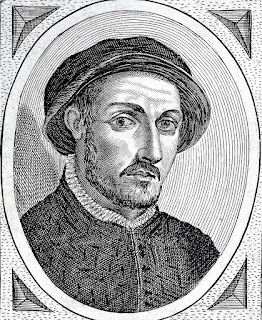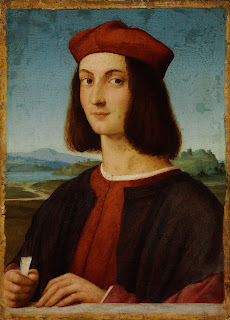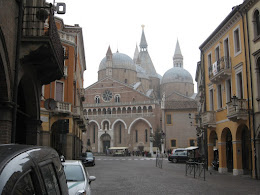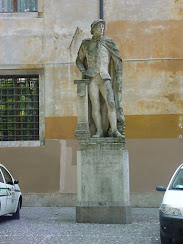NEW - Angelo Beolco - playwright
Actor and dramatist with a genius for comedy
One of the most powerful Italian dramatists of the 16th century, Angelo Beolco, who was nicknamed Ruzzante (or sometimes Ruzante) after his favourite character, died on this day in 1542 in Padua in the Veneto region. Beolco was famous for his rustic comedies, which were written mostly in the Paduan dialect of the Venetian language. Many of his plays featured a peasant called Ruzzante and they painted a vivid picture of life in the Paduan countryside during the 16th century. Beolco was born in Padua in 1496 and was the illegitimate son of a doctor. His mother was possibly a maid in the household where he was brought up by his father. He received a good education and after his father’s death became manager of the family estate. In 1529, he also became manager of a farm owned by a nobleman, Alvise Cornaro, who had retired to live in the Paduan countryside. Cornaro later became Beolco’s friend and protector. Beolco met and associated with Paduan intellectuals of the time, such as the poet Pietro Bembo and the scholar and dramatist Sperone Speroni, which led to him developing an interest in the theatre. Read more…
____________________________________
Giovanni Trapattoni - football coach
His seven Serie A titles is unequalled achievement
Giovanni Trapattoni, the former Juventus and Internazionale coach who is one of only four coaches to have won the principal league titles of four different European countries, was born on this day in 1939 in Cusano Milanino, a suburb on the northern perimeter of Milan. The most successful club coach in the history of Serie A, he won seven titles, six with Juventus and one with Inter. His nearest challengers in terms of most Italian domestic championships are Fabio Capello and Marcello Lippi, each of whom has five Scudetti to his name. In addition, Trapattoni has also won the German Bundesliga with Bayern Munich, the Portuguese Primeira Liga with Benfica and the Austrian Bundesliga with Red Bull Salzburg, with whom he secured his 10th league title all told in 2007. Current Manchester United boss Jose Mourinho is among the other three managers to have won titles in four countries. He has been successful in Portugal, England, Italy and Spain. Alongside former Bayern Munich coach Udo Lattek, Trapattoni is the only coach to have won all three major European club competitions and the only one to do it with the same club. Read more…
______________________________________
Gabriele Ferzetti - actor
Starred in classic Italian films as well as Bond movie
The actor Gabriele Ferzetti, best known to international audiences for his role in the 1969 Bond movie On Her Majesty’s Secret Service but in Italy for the Michelangelo Antonioni classic L’Avventura (1960), was born on this day in 1925 in Rome. Ferzetti, who cut a naturally elegant and debonair appearance, was the go-to actor for handsome, romantic leads in the early part of his career and although he was ultimately eclipsed to some extent by Marcello Mastroianni, he seemed equally content with prominent supporting roles. Rarely idle, he made more than 160 films and appeared in countless TV dramas and was still working at 85 years old. His intense performance as Antonioni’s wealthy yet unfulfilled playboy opposite Lea Massari and Monica Vitti in L’Avventura was the role that identified him most as an actor of considerable talent. Ferzetti had played a similar character in another Antonioni classic Le amiche (1955). Outside Italian cinema, he was memorable as the unscrupulous Morton, the railroad magnate who hobbled around on crutches in Sergio Leone’s Once Upon a Time in the West (1968). Read more…
____________________________________
Innocenzo Manzetti - inventor
Made prototype telephone 33 years ahead of Bell
The inventor Innocenzo Manzetti, credited by some scientific historians as having been the creator of a forerunner of the telephone many years ahead of his compatriot Antonio Meucci and the Scottish-American Alexander Graham Bell, was born on this day in 1826 in Aosta, in northwest Italy. Manzetti's extraordinary catalogue of inventions included a steam-powered car, a hydraulic water pump, a pendulum watch that would keep going for a whole year and a robot that could play the flute. But he was a man whose creative talents were not allied to business sense. Like Meucci, a Florentine emigrant to New York who demonstrated a telephone-like device in 1860 - 16 years before Bell was granted the patent - Manzetti did not patent his device and therefore missed out on the fortune that came the way of Bell. Research has found that Manzetti may have had the idea for a "vocal telegraph" as early as 1843, as a result of his success with his flute-playing automaton, which he constructed as a life-size model of a man sitting on a chair, inside which were concealed a system of levers, rods and compressed air tubes that enabled his lips and fingers to move on the flute. Read more…
______________________________________
Kingdom of Italy proclaimed
First king of Italy calls himself Victor Emmanuel II
The newly-unified Kingdom of Italy was officially proclaimed on this day in 1861 in Turin. The first Italian parliament to meet in the city confirmed Victor Emmanuel as the first King of the new country. It was the monarch's own choice to call himself Victor Emmanuel II, rather than Victor Emmanuel I. This immediately provoked criticism from some factions, who took it as implying that Italy had always been ruled by the House of Savoy. Victor Emmanuel I, with whom Victor Emmanuel II had ancestral links, had been King of Sardinia - ruled by the Dukes of Savoy - from 1802 until his death in 1824. Victor Emmanuel II had become King of Sardinia in 1849 after his father, Charles Albert, abdicated. His father had succeeded a distant cousin, Charles Felix, to become King of Sardinia in 1831. The Kingdom of Sardinia is considered to be the legal predecessor to the Kingdom of Italy. As King of Sardinia, Victor Emmanuel II had appointed Count Camillo Benso of Cavour as Prime Minister of Sardinia-Piedmont, who had then masterminded a clever campaign to put him on the throne of a united Italy. Victor Emmanuel II had become the symbol of the Risorgimento, the Italian unification movement in the 19th century. Read more…





























